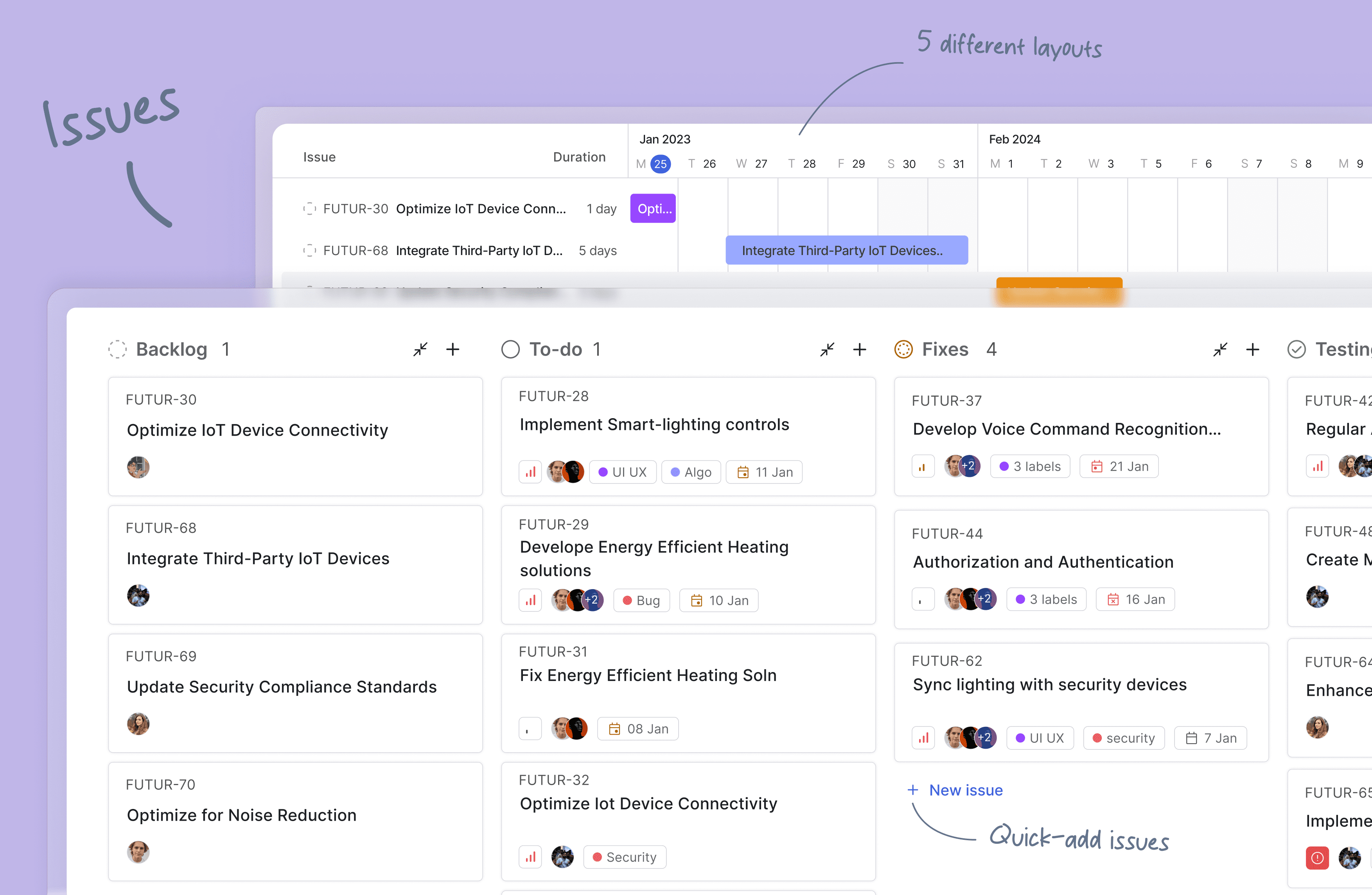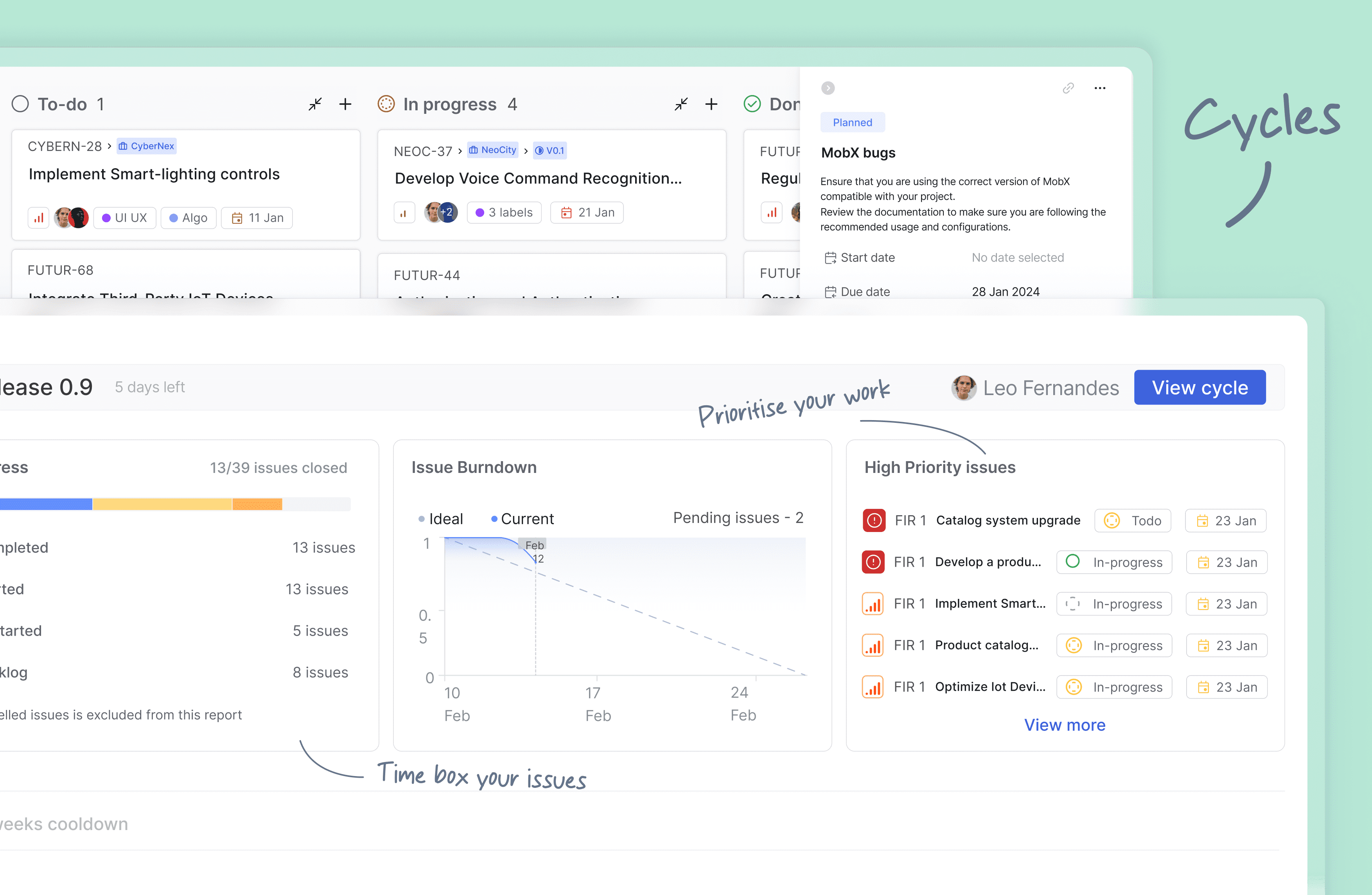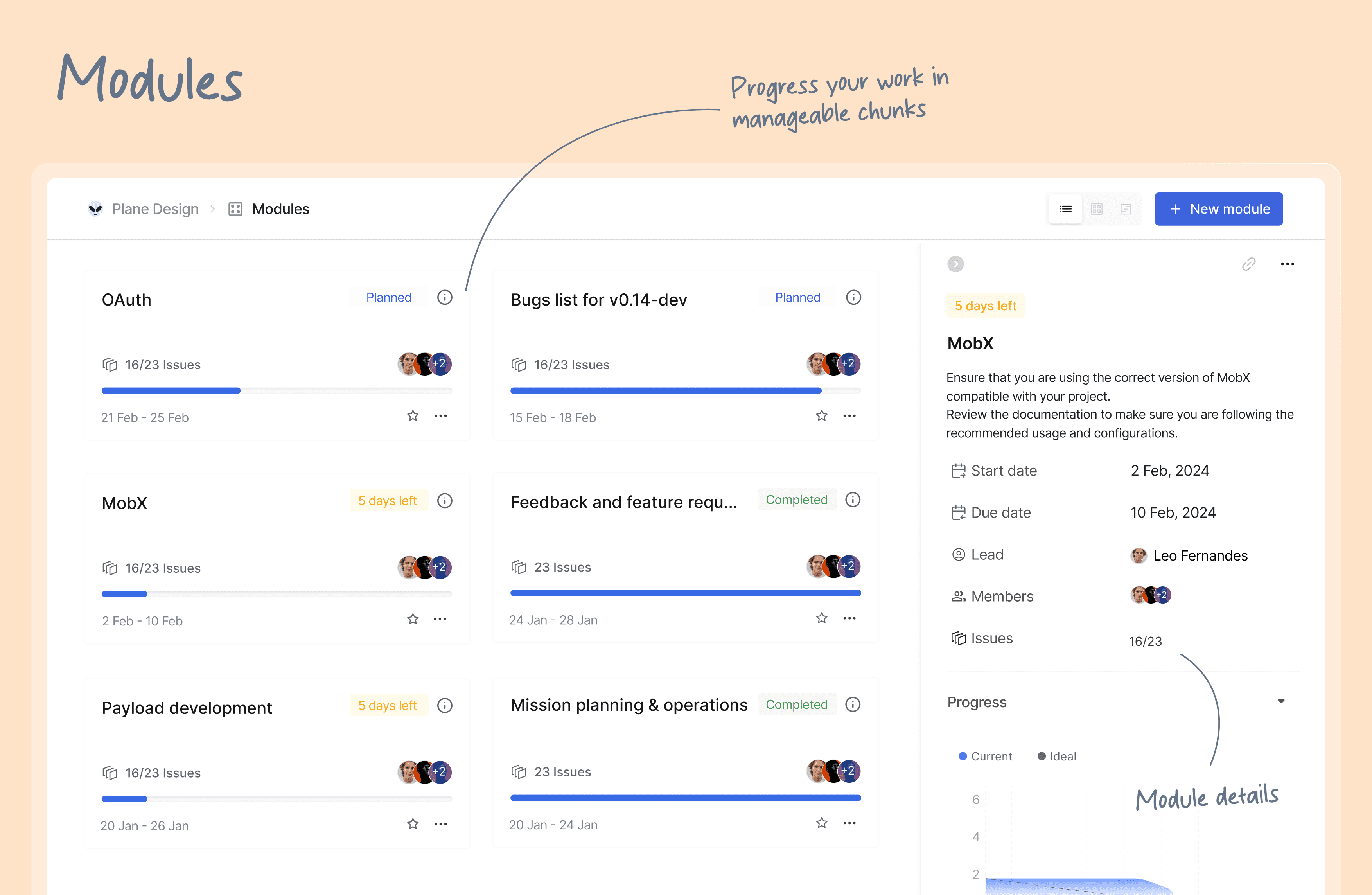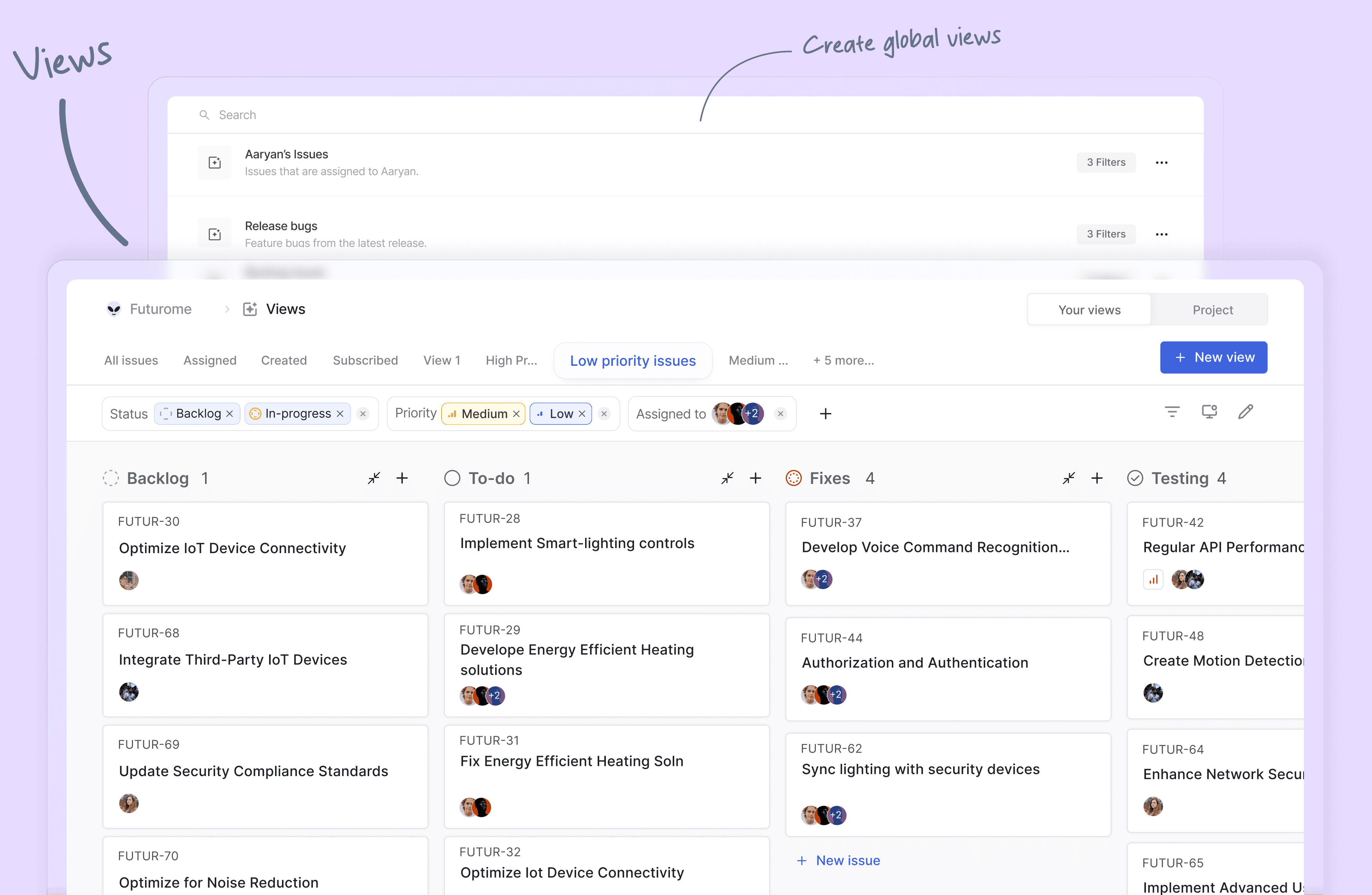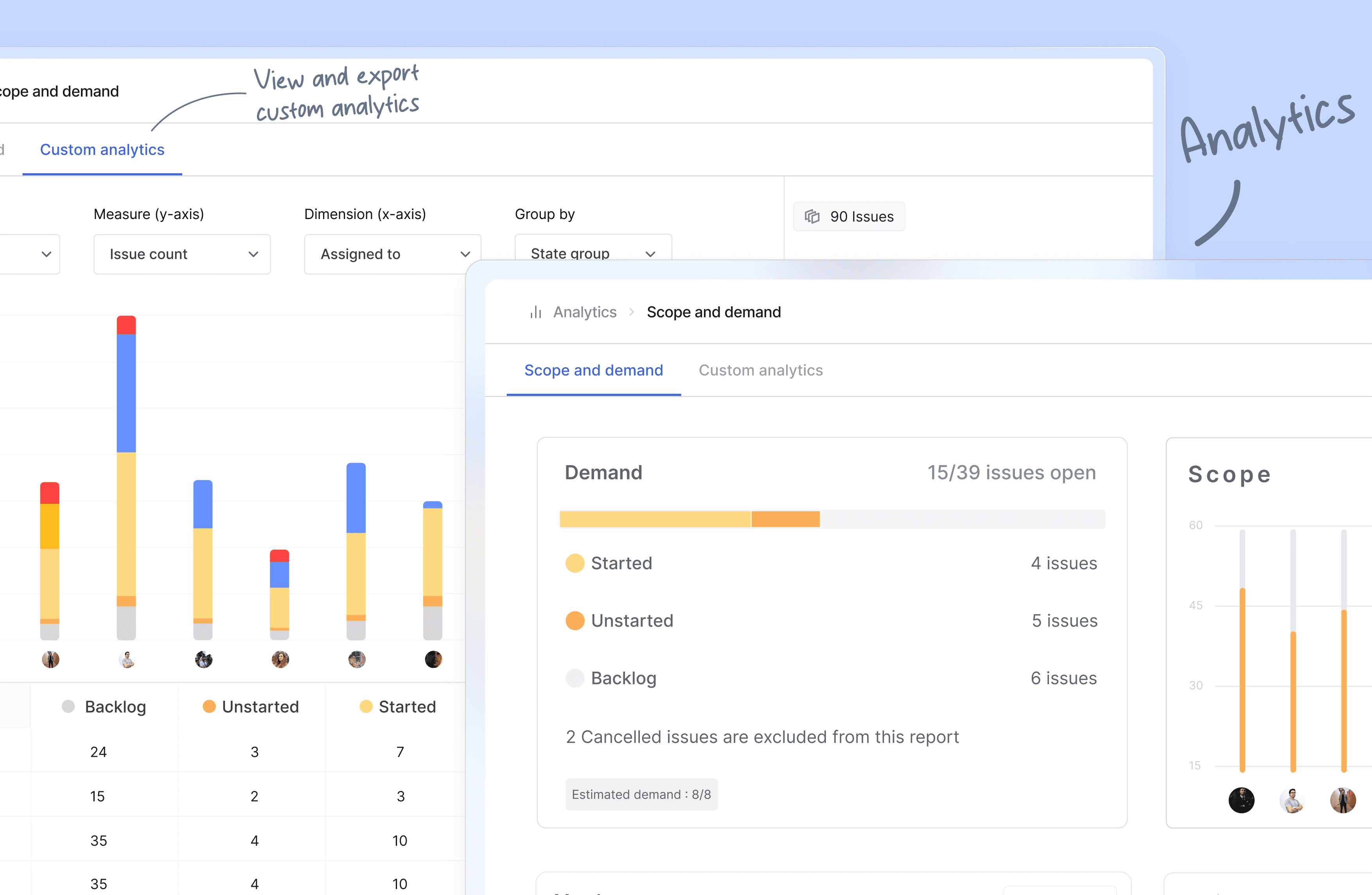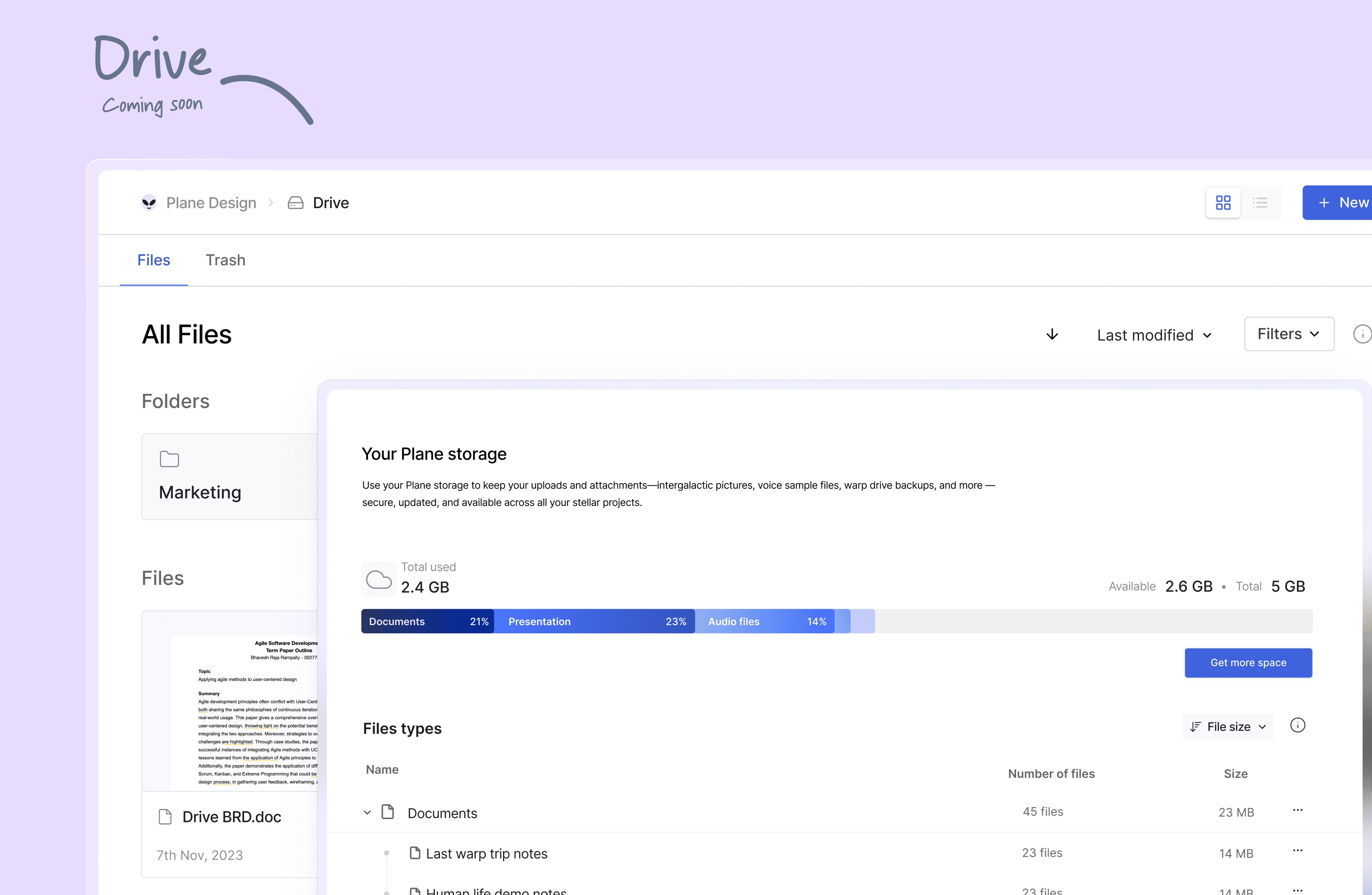 plane
plane
🔥 🔥 🔥 Open Source JIRA, Linear, Monday, and Asana Alternative. Plane helps you track your issues, epics, and cycles the easiest way on the planet.
Top Related Projects
The Open Source kanban (built with Meteor). Keep variable/table/field names camelCase. For translations, only add Pull Request changes to wekan/i18n/en.i18n.json , other translations are done at https://app.transifex.com/wekan/wekan only.
Kanban project management software
Open Source Metering and Usage Based Billing API ⭐️ Consumption tracking, Subscription management, Pricing iterations, Payment orchestration & Revenue analytics
Leantime is a goals focused project management system for non-project managers. Building with ADHD, Autism, and dyslexia in mind.
Quick Overview
Plane is an open-source project management tool designed to provide a comprehensive solution for software development teams. It offers features like issue tracking, project planning, and team collaboration, aiming to be a flexible and customizable alternative to commercial project management platforms.
Pros
- Open-source and self-hostable, providing full control over data and customization
- Offers a clean and intuitive user interface, making it easy for teams to adopt
- Integrates with popular development tools like GitHub and GitLab
- Supports multiple project views, including Kanban boards, lists, and Gantt charts
Cons
- As a relatively new project, it may lack some advanced features found in more established tools
- Self-hosting requires technical expertise and resources for setup and maintenance
- The community and ecosystem are still growing, which may result in fewer integrations and extensions compared to commercial alternatives
- Documentation and support resources may be less comprehensive than those of paid solutions
Getting Started
To get started with Plane, follow these steps:
-
Clone the repository:
git clone https://github.com/makeplane/plane.git -
Navigate to the project directory:
cd plane -
Install dependencies:
npm install -
Set up environment variables:
- Copy the
.env.examplefile to.env - Update the variables in
.envwith your configuration
- Copy the
-
Start the development server:
npm run dev -
Access the application at
http://localhost:3000
For detailed installation and configuration instructions, refer to the project's documentation in the GitHub repository.
Competitor Comparisons
The Open Source kanban (built with Meteor). Keep variable/table/field names camelCase. For translations, only add Pull Request changes to wekan/i18n/en.i18n.json , other translations are done at https://app.transifex.com/wekan/wekan only.
Pros of Wekan
- More mature project with longer development history and larger community
- Self-hosted option provides greater control over data and privacy
- Highly customizable with extensive plugin ecosystem
Cons of Wekan
- Less modern user interface compared to Plane
- Steeper learning curve for setup and configuration
- Limited native integrations with other tools
Code Comparison
Wekan (server-side rendering):
Template.boardList.helpers({
boards() {
return Boards.find({
archived: false,
'members.userId': Meteor.userId(),
}, {
sort: ['title'],
});
},
});
Plane (React-based frontend):
const BoardList = () => {
const { data: boards } = useQuery(BOARDS_QUERY);
return (
<ul>
{boards.map(board => (
<li key={board.id}>{board.title}</li>
))}
</ul>
);
};
Both projects use JavaScript, but Wekan relies on Meteor's templating system for server-side rendering, while Plane uses React for a more modern, component-based approach. Wekan's code is more tightly coupled to its backend, whereas Plane's frontend is more decoupled and potentially easier to maintain.
Kanban project management software
Pros of Kanboard
- Lightweight and minimalist design, suitable for simple project management
- Self-hosted solution with better privacy control
- Extensive plugin system for customization
Cons of Kanboard
- Less modern UI/UX compared to Plane
- Fewer built-in integrations with other tools and services
- Limited advanced features for complex project management scenarios
Code Comparison
Kanboard (PHP):
<?php
require_once __DIR__.'/Base.php';
class Project extends Base
{
const TABLE = 'projects';
Plane (JavaScript):
import { useRouter } from "next/router";
import { useState } from "react";
import { mutate } from "swr";
Both projects use different programming languages and frameworks, making direct code comparison challenging. Kanboard is built with PHP, while Plane uses JavaScript with Next.js. The code snippets show basic structural differences in how the projects are organized and implemented.
Open Source Metering and Usage Based Billing API ⭐️ Consumption tracking, Subscription management, Pricing iterations, Payment orchestration & Revenue analytics
Pros of Lago
- Specialized focus on usage-based billing and metering
- Robust API and webhooks for integration flexibility
- Supports complex pricing models and multi-currency billing
Cons of Lago
- Limited project management features compared to Plane
- Less emphasis on team collaboration and task tracking
- Narrower scope, primarily focused on billing rather than overall project management
Code Comparison
Lago (Ruby):
class BillableMetric < ApplicationRecord
include PaperTrailTraceable
include Discard::Model
belongs_to :organization
has_many :charges, dependent: :destroy
has_many :groups, class_name: 'BillableMetricGroup', dependent: :destroy
Plane (Python):
class Project(BaseModel):
name: str = Field(..., max_length=255)
identifier: str = Field(..., max_length=255)
description: Optional[str] = Field(default=None)
emoji: Optional[str] = Field(default=None)
icon_prop: Optional[Dict] = Field(default=None)
Summary
Lago excels in usage-based billing and metering, offering powerful features for complex pricing models. However, it lacks the comprehensive project management capabilities found in Plane. Plane provides a more holistic approach to project management and team collaboration, while Lago focuses primarily on billing and revenue management. The choice between the two depends on whether billing or overall project management is the primary need.
Leantime is a goals focused project management system for non-project managers. Building with ADHD, Autism, and dyslexia in mind.
Pros of Leantime
- More established project with a longer history and larger community
- Offers a wider range of features, including time tracking and invoicing
- Provides a self-hosted option for better data control and customization
Cons of Leantime
- Steeper learning curve due to more complex feature set
- Less modern UI/UX compared to Plane
- Requires more server resources for deployment
Code Comparison
Leantime (PHP):
public function get($id)
{
$sql = "SELECT
id,
headline,
type,
description,
date,
sprint,
projectId,
priority
FROM zp_tickets WHERE id = :id LIMIT 1";
$stmn = $this->db->database->prepare($sql);
$stmn->bindValue(':id', $id, PDO::PARAM_INT);
$stmn->execute();
$values = $stmn->fetch();
$this->fillObjectValues($values);
}
Plane (Python):
def get(self, request, slug, pk):
project = Project.objects.get(slug=slug)
issue = Issue.objects.get(pk=pk, project_id=project.id)
serializer = IssueSerializer(issue, fields=self.fields)
return Response(serializer.data, status=status.HTTP_200_OK)
Both repositories offer project management solutions, but Leantime provides a more comprehensive set of features at the cost of complexity, while Plane focuses on a streamlined, modern approach to issue tracking and project organization.
Convert  designs to code with AI
designs to code with AI

Introducing Visual Copilot: A new AI model to turn Figma designs to high quality code using your components.
Try Visual CopilotREADME
Plane
Open-source project management that unlocks customer value
Website ⢠Releases ⢠Twitter ⢠Documentation
Meet Plane, an open-source project management tool to track issues, run sprints cycles, and manage product roadmaps without the chaos of managing the tool itself. ð§ââï¸
Plane is evolving every day. Your suggestions, ideas, and reported bugs help us immensely. Do not hesitate to join in the conversation on Discord or raise a GitHub issue. We read everything and respond to most.
ð Installation
Getting started with Plane is simple. Choose the setup that works best for you:
-
Plane Cloud
Sign up for a free account on Plane Cloudâit's the fastest way to get up and running without worrying about infrastructure. -
Self-host Plane
Prefer full control over your data and infrastructure? Install and run Plane on your own servers. Follow our detailed deployment guides to get started.
| Installation methods | Docs link |
|---|---|
| Docker |  |
| Kubernetes |  |
Instance admins can configure instance settings with God mode.
ð Features
-
Issues
Efficiently create and manage tasks with a robust rich text editor that supports file uploads. Enhance organization and tracking by adding sub-properties and referencing related issues. -
Cycles
Maintain your teamâs momentum with Cycles. Track progress effortlessly using burn-down charts and other insightful tools. -
Modules
Simplify complex projects by dividing them into smaller, manageable modules. -
Views
Customize your workflow by creating filters to display only the most relevant issues. Save and share these views with ease. -
Pages
Capture and organize ideas using Plane Pages, complete with AI capabilities and a rich text editor. Format text, insert images, add hyperlinks, or convert your notes into actionable items. -
Analytics
Access real-time insights across all your Plane data. Visualize trends, remove blockers, and keep your projects moving forward. -
Drive (coming soon): The drive helps you share documents, images, videos, or any other files that make sense to you or your team and align on the problem/solution.
ð ï¸ Local development
Pre-requisites
- Ensure Docker Engine is installed and running.
Development setup
Setting up your local environment is simple and straightforward. Follow these steps to get started:
-
Clone the repository:
git clone https://github.com/makeplane/plane.git -
Navigate to the project folder:
cd plane -
Create a new branch for your feature or fix:
git checkout -b <feature-branch-name> -
Run the setup script in the terminal:
./setup.sh -
Open the project in an IDE such as VS Code.
-
Review the
.envfiles in the relevant folders. Refer to Environment Setup for details on the environment variables used. -
Start the services using Docker:
docker compose -f docker-compose-local.yml up -d
Thatâs it! Youâre all set to begin coding. Remember to refresh your browser if changes donât auto-reload. Happy contributing! ð
âï¸ Built with
ð¸ Screenshots
ð Documentation
Explore Plane's product documentation and developer documentation to learn about features, setup, and usage.
â¤ï¸ Community
Join the Plane community on GitHub Discussions and our Discord server. We follow a Code of conduct in all our community channels.
Feel free to ask questions, report bugs, participate in discussions, share ideas, request features, or showcase your projects. Weâd love to hear from you!
ð¡ï¸ Security
If you discover a security vulnerability in Plane, please report it responsibly instead of opening a public issue. We take all legitimate reports seriously and will investigate them promptly. See Security policy for more info.
To disclose any security issues, please email us at security@plane.so.
ð¤ Contributing
There are many ways you can contribute to Plane:
- Report bugs or submit feature requests.
- Review the documentation and submit pull requests to improve itâwhether it's fixing typos or adding new content.
- Talk or write about Plane or any other ecosystem integration and let us know!
- Show your support by upvoting popular feature requests.
Please read CONTRIBUTING.md for details on the process for submitting pull requests to us.
Repo activity
We couldn't have done this without you.
License
This project is licensed under the GNU Affero General Public License v3.0.
Top Related Projects
The Open Source kanban (built with Meteor). Keep variable/table/field names camelCase. For translations, only add Pull Request changes to wekan/i18n/en.i18n.json , other translations are done at https://app.transifex.com/wekan/wekan only.
Kanban project management software
Open Source Metering and Usage Based Billing API ⭐️ Consumption tracking, Subscription management, Pricing iterations, Payment orchestration & Revenue analytics
Leantime is a goals focused project management system for non-project managers. Building with ADHD, Autism, and dyslexia in mind.
Convert  designs to code with AI
designs to code with AI

Introducing Visual Copilot: A new AI model to turn Figma designs to high quality code using your components.
Try Visual Copilot







